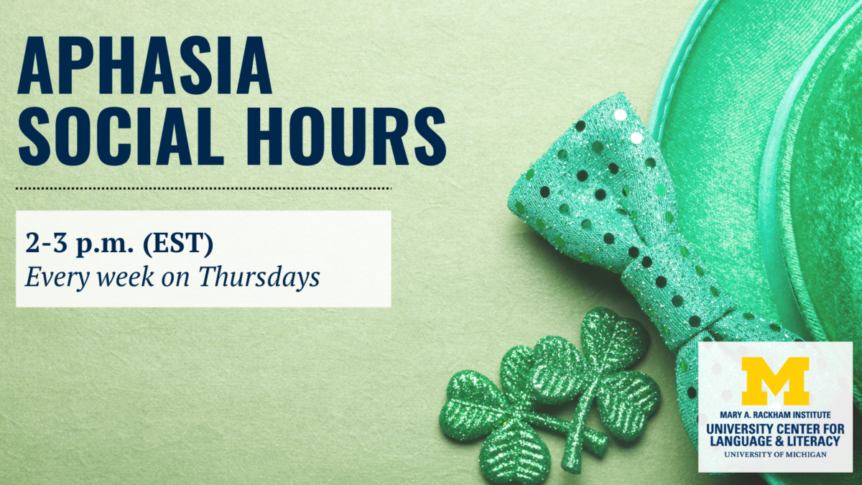The U-M Aphasia Program (UMAP)’s virtual Aphasia Social Hours happen weekly! Every Thursday, you can connect with others with aphasia and practice communication skills in a low-pressure setting.
The virtual social hours take place from 2-3 p.m. (EST), every Thursday, and are free, but registration is required.
The next social hour is scheduled for this Thursday, March 7, 2024 from 2-3 p.m. (Eastern) via Zoom.
Click here to register. NOTE: You only need to register once for all the social hours, you do not need to register each week.
March 2024 Dates
- March 7
- March 14
- March 21
- March 28
How to Register
Participation is free, but registration is required to get the Zoom link to join the conversation. When you register, you only need to register once to access all the social hours. CLICK HERE TO REGISTER
Once you register, you will get a confirmation email with the link to the social hour. Make sure to check your spam folder if you don’t see it in your inbox.
What to Expect
Each social hour is typically 50-55 minutes long and includes interaction with others with aphasia. The social hours are free and voluntary sessions, and are not therapy or offered in place of therapy.
Care partners are encouraged to assist the person with aphasia, but we ask that care partners refrain from taking an active role in the conversation so people with aphasia have the time and space to connect.
New to Zoom or Online Teleconferencing?
Check out our aphasia-friendly guide to using online meeting software: UMAP’s Guide to Joining Zoom from a Computer
About the U-M Aphasia Program and UCLL
The U-M Aphasia Program (UMAP) provides intensive, comprehensive speech-language therapy for people with aphasia, caused by a stroke, brain injury, illness, or other neurological disorder. UMAP is part of the University Center for Language and Literacy (UCLL), which is committed to helping people of all ages find meaningful ways to communicate. UCLL is part of the Mary A. Rackham Institute (MARI) at the University of Michigan.

